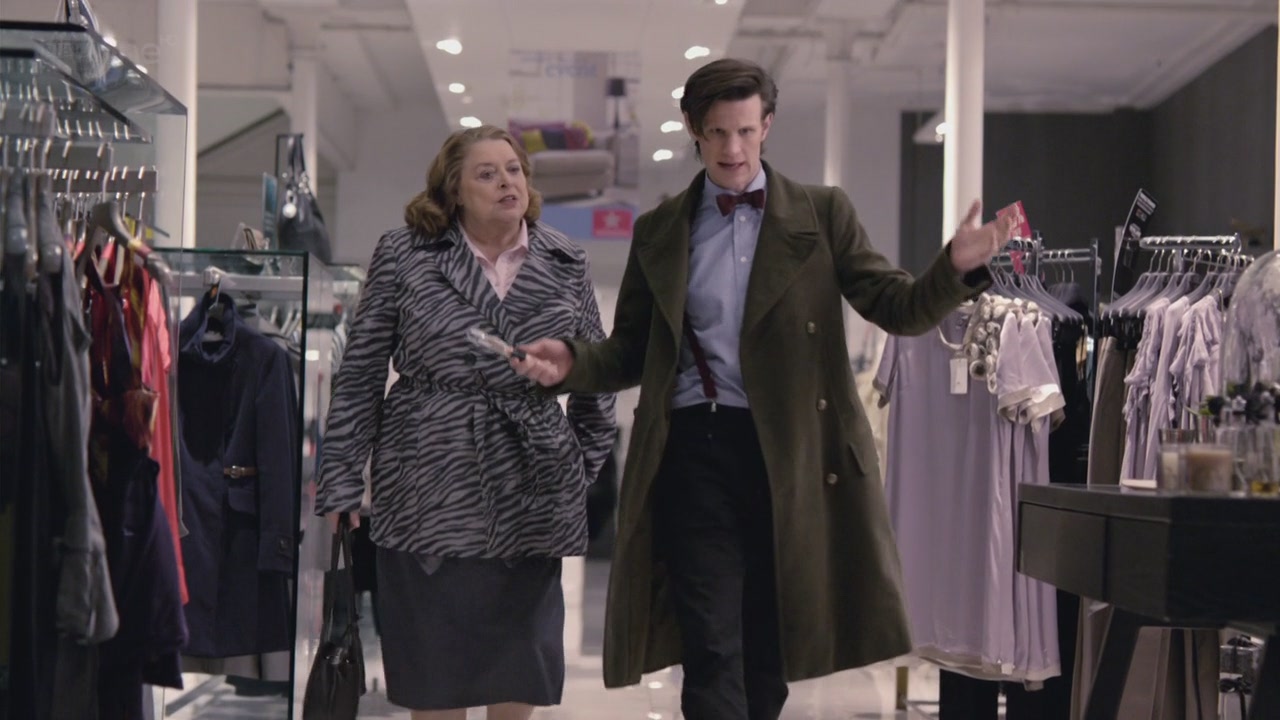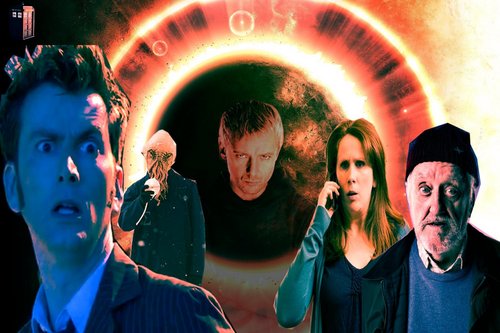

In many ways, the Cybermen are just thematic placeholders for the Silence, who are arguably the ultimate in qlippothic monsters. Which brings us to the end of the story, in which the Silence finally come for River Song and set up the inevitable death of the Doctor that has been teased since the start of the season. And, of course, within all of this is an impeccable Gareth Roberts script long on humor and warmth and humanity.

And what it means to be a dad, quite compatibly with Moffat’s larger ethos of masculinity, it that when your son is crying because of the Cybermen, you get your shit together and blow them up. His role within the narrative is to help teach Craig what it means to be a dad. The Doctor’s role in this is oddly wonderful – he perfectly understands Stormageddon/Alfie, to the point of “speaking baby.” Equally, however, he’s manifestly not a father figure, but instead a strange alien hunting Cybermen. And this is the basic problem of Closing Time – Craig having to find out and define for himself what “being a dad” means.

Which finally brings us back to Closing Time and its interest in a particular anxiety of fatherhood – one that’s been analyzed ad nauseum, but that comes down to the basic fact that mothers have a variety of biological functions for embryos and infants that fathers simply don’t, and that this results in a fundamental asymmetry in child-rearing. And for the most part, this is how Moffat’s Doctor Who (and almost everything else he writes) works – it repeatedly and aggressively interrogates and renegotiates the relationship between a particular type of male hero and the female characters who exist in the space around that hero. A secondary thrust of this is the treatment of the Doctor, which fits into a career-long pattern on Moffat’s part of interrogating the ethos of clever men/authorial self-inserts (which, as Joking Apart and Coupling both demonstrate are, for Moffat, basically the same thing), although ultimately, as with any of Moffat’s interrogations of that, after diagnosing a number of ways in which clever men are problematic, this quickly turns into an unabashed “but aren’t they wonderful” of the sort that, while probably true, is nevertheless comically self serving. Obviously the main thrust of this, and it’s something we saw very clearly in the subversion of the rape/revenge plot in A Good Man Goes to War and the subsequent story of female spaces and healing that is Let’s Kill Hitler, is telling different stories about women and giving girls a different set of narratives to absorb about their place in the world, specifically ones that highlight the fact that they are entitled to have stories of their own. His feminism may be imperfect (in fact it is imperfect, in ways that are not entirely different from the ways that William Moulton Marston’s feminism is imperfect, but as anyone who has read the book where I talk about that will know, feminism is an ongoing process of making new mistakes, and Moffat accomplishes that with aplomb), but anyone who attempts to argue that Moffat is not consciously attempting to write feminist television is simply and factually incorrect. He is an ideologically feminist writer, a point that can trivially be demonstrated by trawling interview quotes. We’ve already seen, at somewhat considerable length, the way in which Moffat is very focused on changing and improving the stories we tell about women. Because I think he is in many ways the most important character in the Moffat era. I’ve been kind of avoiding Rory, for pretty much the exact same reason that I avoided talking about death much in Miracle Day, but since we’re now on an episode in which he has exactly zero lines, this is obviously the time to talk about him. Placing his life entirely in their hands, the Doctor agrees to search for the recipient of the fourth envelope – just who is Canton Everett Delaware the Third? And what is the relevance of their only other clue: ‘Space 1969′? Their quest lands them – quite literally – in the Oval Office, where they are enlisted by President Nixon himself to assist enigmatic former-FBI agent Canton, in saving a terrified little girl from a mysterious spaceman.Ah, right.

Who sent them? And who received the missing number one? This strange summons reunites the Doctor, Amy, Rory and River Song in the middle of the Utah desert and unveils a terrible secret the Doctor’s friends must never reveal to him. The Impossible Astronaut/Day of the Moon Synopsisįour envelopes, numbered 2, 3 and 4, each containing a date, time and map reference, unsigned, but TARDIS blue.


 0 kommentar(er)
0 kommentar(er)
